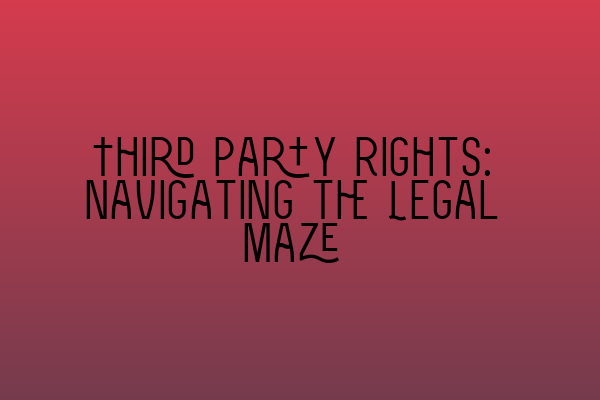Third Party Rights: Navigating the Legal Maze
Contracts are a fundamental part of business transactions, designed to govern the rights and obligations of the parties involved. However, what happens when a third party, who is not a party to the contract, seeks to enforce or rely on its terms? This is where third party rights come into play, opening up a complex legal maze that requires careful navigation.
In this article, we will explore the concept of third party rights in contract law, the different types of third party rights, and the challenges involved in enforcing such rights. We will also provide insights and practical tips for both businesses and individuals seeking to understand and navigate this intricate area of law.
The Concept of Third Party Rights
Traditionally, contract law operates on the principle of privity of contract, which means that only the parties to a contract can enforce its terms and benefit from its provisions. However, there are situations where it may be necessary or desirable to include third parties in contractual arrangements, such as assignments, novations, and warranties.
Third party rights can arise in various ways:
- Assignment: An assignment occurs when one party transfers its rights and benefits under a contract to a third party. The third party, known as the assignee, steps into the shoes of the original party, known as the assignor, and can enforce the rights and benefits assigned to them.
- Novation: Novation is a process by which one party to a contract is replaced with a new party, resulting in the original party being released from their obligations. The new party, known as the novatee, becomes a direct party to the contract and can enforce its terms.
- Warranty: A warranty is a promise or guarantee made by one party to a contract for the benefit of a third party. Unlike assignments and novations, a third party with a warranty does not become a direct party to the contract but can still enforce the promise made by the warrantor.
Enforcing Third Party Rights
While the inclusion of third party rights in contracts can provide flexibility and practical benefits, enforcing such rights can be complex and challenging. There are several legal considerations that need to be taken into account:
- Clear and Unambiguous Contract Language: To ensure enforceability, it is crucial to have clear and unambiguous language in the contract to clearly identify the parties and their intentions regarding third party rights. Ambiguities or uncertainties in the contract may lead to disputes and uncertainty regarding the enforceability of third party rights.
- Notification: In certain jurisdictions, the third party must be notified of their rights under the contract in order to enforce them. Failure to provide notice within the required timeframe may result in the third party being unable to enforce their rights.
- Consent: Depending on the jurisdiction and the nature of the third party rights, the consent of the contracting parties or the third party may be required for the rights to be valid and enforceable. It is important to consider any consent requirements and seek appropriate legal advice when including third party rights in a contract.
It is worth noting that the enforceability of third party rights can vary between jurisdictions, as contract law is often governed by national or regional legislation. Therefore, it is essential to consult legal professionals who specialize in contract law in the relevant jurisdiction to ensure compliance with applicable laws and regulations.
Practical Tips for Navigating Third Party Rights
When it comes to third party rights, there are several practical tips that businesses and individuals can follow to navigate the legal maze:
- Thoroughly Review Contracts: Before entering into any contract, carefully review its terms and consider whether third party rights are required or desirable. Assess the potential impact on all parties involved and seek legal advice if necessary.
- Ensure Clear Contract Language: Use clear and unambiguous language in the contract to identify the parties, their respective rights and obligations, and any additional provisions regarding third party rights.
- Follow Legal Formalities: Be aware of any legal formalities required to enforce third party rights, such as notification or consent. Failure to comply with these formalities may render the third party rights unenforceable.
- Consult Legal Experts: Contract law can be complex, and navigating third party rights requires expertise and knowledge. It is advisable to consult legal professionals who specialize in contract law to ensure compliance and maximize the enforceability of third party rights.
In conclusion, third party rights can provide valuable flexibility and practical benefits in contractual arrangements. However, navigating the legal maze surrounding third party rights requires careful consideration of contract language, legal formalities, and the applicable jurisdictional requirements. By following the practical tips outlined in this article and seeking legal advice when necessary, businesses and individuals can effectively navigate the challenges and uncertainties associated with third party rights.
If you found this article informative, you might also be interested in the following related articles:
- Exploring the Impact of Frustration on Contractual Obligations: Legal Insights
- Interpreting Contractual Clauses: Unlocking the Hidden Meanings
- Legal Aspects of Business Contracts: Key Considerations for Entrepreneurs
- SQE Contract Law vs. Traditional Qualifications: A Comparative Analysis
- Agreements in Contract Law: Understanding Its Various Types
